Search Clinical Trials
Our researchers are currently in need of adult and pediatric study participants to help us pursue better treatments and cures. Participants may receive medical evaluations and procedures, study medication, disease-related education and possible financial compensation for time, travel and participation.
Select a Condition or Specialty
- Allergy
- Alpha-1 Antitrypsin Deficiency
- Asthma
- Cardiology
- Chronic Obstructive Pulmonary Disease (COPD)
- COVID-19 (Coronavirus)
- Cystic Fibrosis
- Eczema (Atopic Dermatitis)
- Environmental & Occupational Health
- Eosinophilic Granulomatosis with Polyangiitis (EGPA)
- Food Allergy
- Gastroenterology
- Idiopathic Pulmonary Fibrosis (IPF)
- Interstitial Lung Disease (Pulmonary Fibrosis)
- Lung Cancer
- Oncology
- Pulmonary Hypertension (PH)
- Respiratory (Pulmonary)
- Rheumatology
- Sarcoidosis
- Sleep
All Clinical Trials
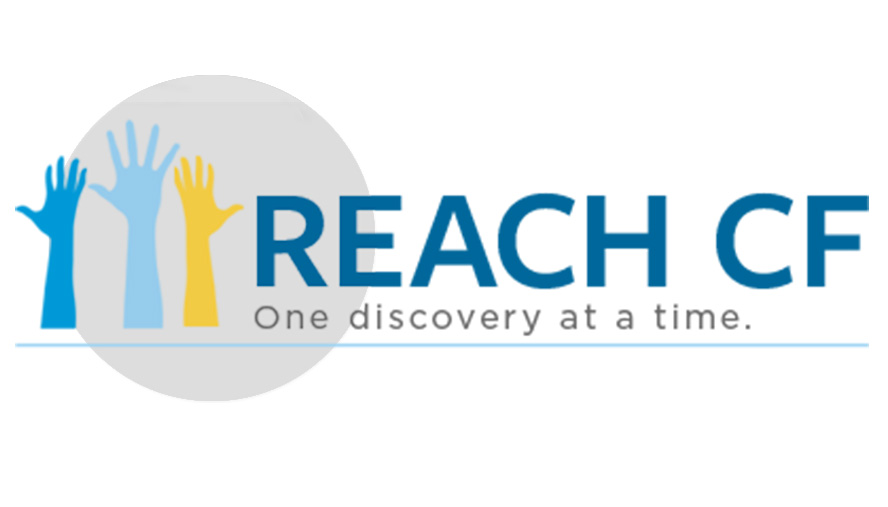
Discovering New Ways to Treat Modulator-Ineligible CF
The REACH Study is a long-term, observational study aiming to gather high-quality data on people with cystic fibrosis (CF) who cannot benefit from CFTR modulators. By collecting core data, REACH will help develop and assess future therapies for this population.
- Gender
- Any
- Ages
- 12+
- Compensation
- Provided
- Time Required
- 4 clinic visits over the course of a year, at enrollment, 3 months, 6 months and 12 months.
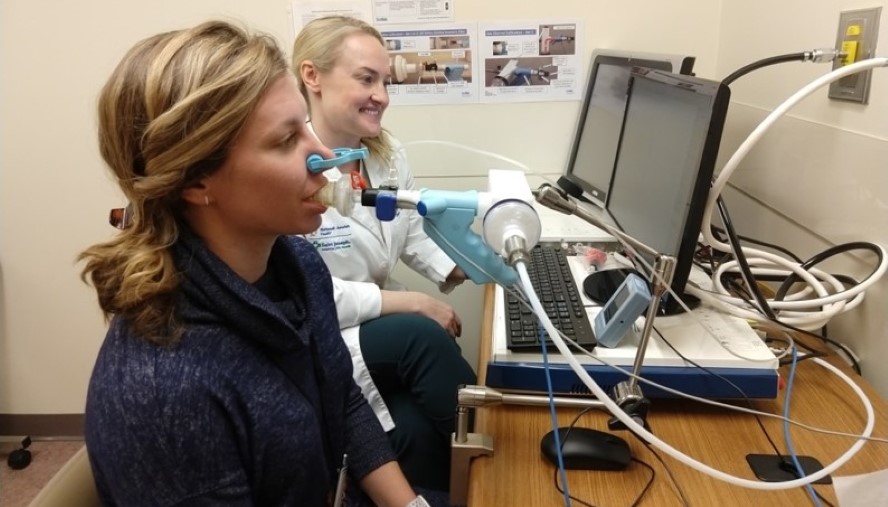
LCI Testing Possible Tool for Identifying ILD Risks in Scleroderma Patients
Lung clearance testing may give researchers a new tool to predict people with scleroderma who are at risk of developing interstitial lung disease. Volunteers are needed for a one-visit clinical trial.
- Gender
- Any
- Ages
- 21-75
- Compensation
- Not Provided
- Time Required
- One 60-minute clinic visit, followed up by one phone call a year for the next 5 years.

Can Combination Rescue Inhalers help Adolescents Control Asthma Flare Ups?
Researchers with the ACADIA Study are trying to determine if a rescue inhaler that doctors can currently prescribe for adults can also help adolescents control their asthma flare-ups. Volunteers are needed. Learn if you are eligible:
- Gender
- Any
- Ages
- 12-18
- Compensation
- Provided
- Time Required
- Approximately 58 weeks (13 months).

Understanding Common Insomnia Treatments in Adults
Chronic insomnia is a serious health concern that affects around 10% of people in America. Current treatments are varied, and often target things that may result in sleep disruption. In this study, researchers are evaluating two common treatments for insomnia in adults to learn more about how they treat symptoms.
- Gender
- Any
- Ages
- 18+
- Compensation
- Provided
- Time Required
- Visits and home data collection over approximately 9-12 months. Some visits can occur virtually.

Possible Treatment for Post-COVID POTS
Postural Orthostatic Tachycardia Syndrome, or POTS, is a chronic condition that involves sudden, rapid increases in heart rate when sitting or standing. This condition can disrupt daily life and trigger other symptoms such as fatigue, dizziness or vertigo. Research has linked POTS symptoms to long-haul COVID-19 infections, but the connection between these conditions is still being studied.
- Gender
- Any
- Ages
- 18+
- Compensation
- Provided
- Time Required
- 17 visits over approximately 60 weeks (15 months). The visits will be divided up into four phases: a screening period (4 weeks), a double-blind treatment period (24 weeks), an open-label treatment period (28 weeks) and a follow-up period (4 weeks).
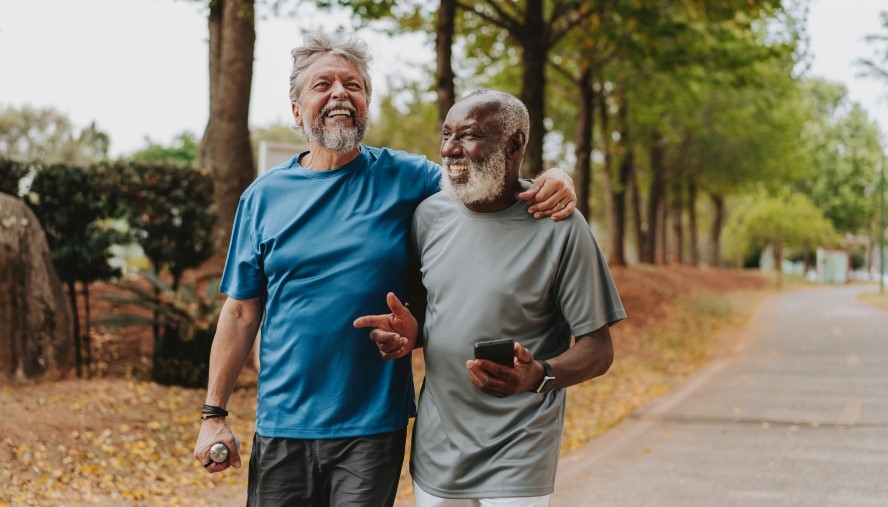
The MIST Clinical Study for PPF
Progressive Pulmonary Fibrosis (PPF) is a rare lung disease that causes scarring in the lung. Researchers are investigating if an inhaled study treatment can help improve lung function with fewer side effects than current treatments.
- Gender
- Any
- Ages
- 18-80
- Compensation
- Provided
- Time Required
- 12 in person visits and 1 phone visit over 56 weeks (13 months), with twice a day nebulizer treatments.
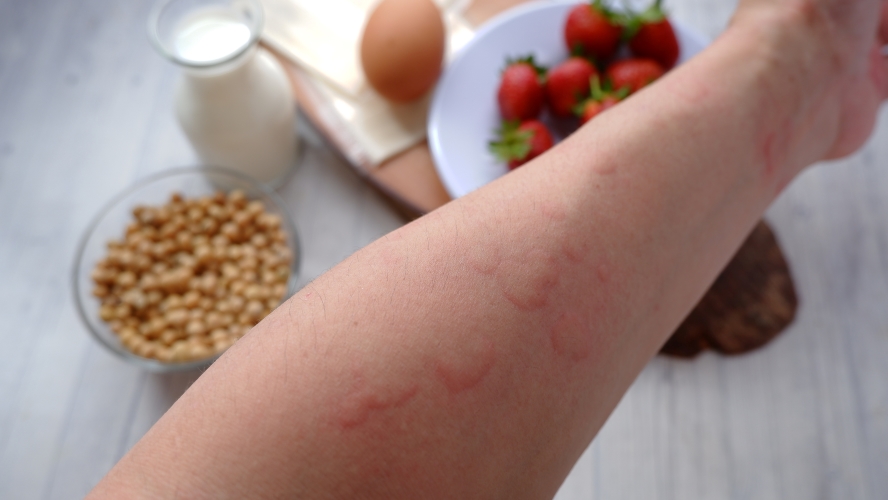
Evaluating Skin Barrier Changes in Food Allergy
Food allergies are complex, and researchers are studying new ways to predict who might develop allergies in the future. In this study, researchers are trying to determine if skin reactions during an oral food challenge can predict food allergies. They also are evaluating if a biologic called omalizumab, which is currently approved to treat asthma, can help people with food allergies.
- Gender
- Any
- Ages
- 1-55
- Compensation
- Provided
- Time Required
- 13 visits over approximately 5 months. Participants without food allergies will only need 1 visit.
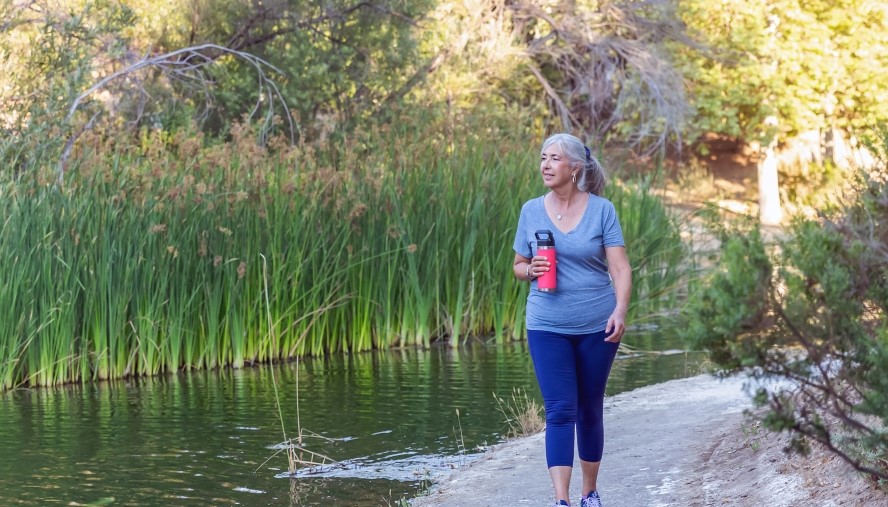
Possible New Inhaled Treatment Option for PH with ILD
Pulmonary hypertension (PH), or high blood pressure in the lungs, can often develop in those who have interstitial lung disease (ILD). Treatments for this combination of diseases, called PH-ILD, to try and improve quality of life for people with both conditions are currently being evaluated.
- Gender
- Any
- Ages
- 18-75
- Compensation
- Provided
- Time Required
- Six visits over approximately 52 weeks, with two initial visits for enrollment and then visits at weeks 8, 16, 24 and 52.
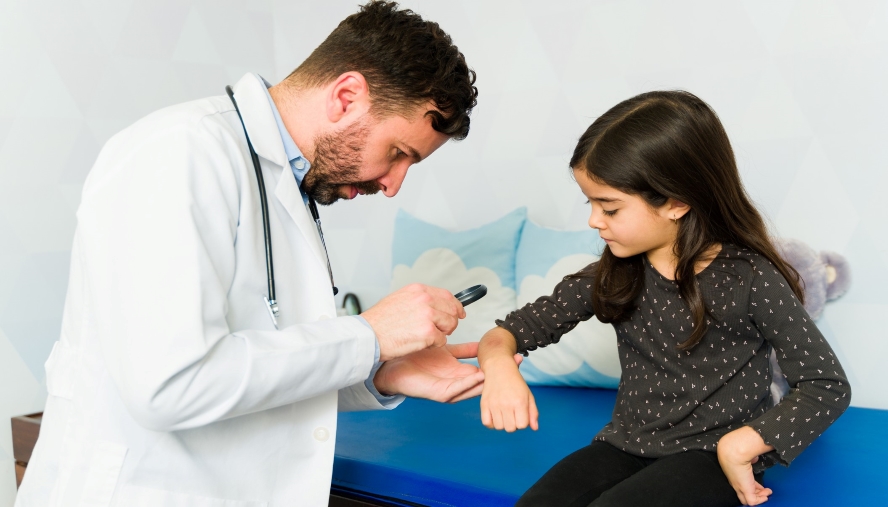
Potential Treatment for Dry Skin in Pediatric Eczema Patients
Many people with eczema (also known as atopic dermatitis) have dry skin, in addition to their other symptoms, which can worsen itching, scratching and skin pain. Researchers want to know if dupilumab, a current immune system treatment for eczema, also may be able to have a long-term impact on dry skin in children with eczema.
- Gender
- Any
- Ages
- 6-12
- Compensation
- Provided
- Time Required
- Approximately 11 clinic visits spread into three periods (screening, intervention, and follow-up) over the course of two years.
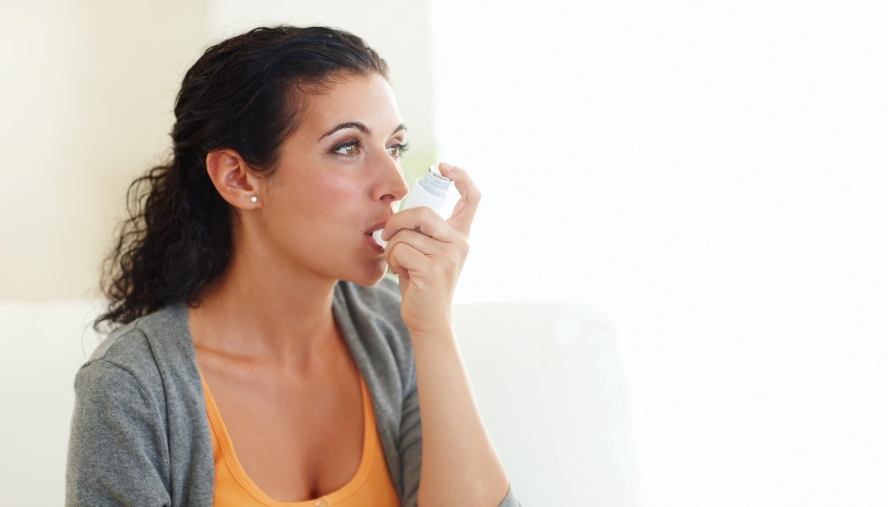
AJAX Study: New Inhaled Medication for Uncontrolled Asthma
In severe asthma, some of the exacerbations that cause difficulty breathing are the result of inflammation in the lung. Researchers are testing a class of anti-inflammatory drugs called a JAK1 inhibitor that has worked to treat other inflammatory conditions like eczema to see if it can help people with severe asthma.
- Gender
- Any
- Ages
- 18-80
- Compensation
- Provided
- Time Required
- 8 visits over 5 months. Visits will last between 1 and 5 hours.

VALIANT Study: A Potential New Treatment for Severe Asthma
Some people with asthma experience frequent exacerbations, involving swelling or narrowing of the airways, which causes shortness of breath, wheezing and cough. In the national study called VALIANT, researchers are evaluating a new investigational treatment called verekitug to see if it is safe and can effectively reduce inflammation to help asthma patients breathe easier.
- Gender
- Any
- Ages
- 18-75
- Compensation
- Provided
- Time Required
- 19 visits over up to 70 weeks (1 year and 4 months). Two screening visits will last about 4 hours each, and all other visits will last between 4 and 6 hours.
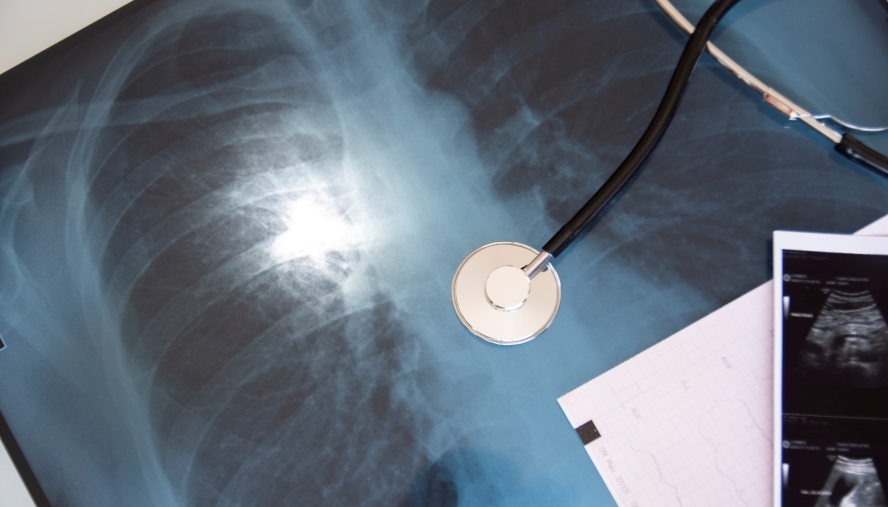
Differences in the Pulmonary Artery of People with Pulmonary Hypertension
Pulmonary hypertension and pulmonary arterial hypertension are two conditions that can cause increased blood pressure within the lungs. The differences between the two conditions on a cellular level are not well understood, and researchers are evaluating cell samples from people that are undergoing a right heart catheterization to learn more about these two diseases and improve future care.
- Gender
- Any
- Ages
- 18+
- Compensation
- Not Provided
- Time Required
- One visit to review and sign consent before scheduled procedure and three follow-up phone calls (once a year for three years).

CMTX-101: IV Treatment of P. aeruginosa in Combination with Inhaled Antibiotics
People with cystic fibrosis (CF) are more vulnerable to a wide variety of bacterial infections in their lungs. One of these bacteria, Pseudomonas aeruginosa, can cause infections that decrease lung function over time. Researchers are evaluating a new therapy that may help people with CF more effectively clear these infections.
- Gender
- Any
- Ages
- 18+
- Compensation
- Provided
- Time Required
- Seven clinic visits over approximately 35 days. Total study duration includes up to 60 days of screening.

Aerify3: A Potential New Treatment for Airway Inflammation in COPD
Treatments for chronic obstructive pulmonary disease (COPD) may still leave people experiencing wheezing, coughing, or shortness of breath. Researchers in the Aerify3 study are investigating a medication called itepekimab, which has shown some potential in earlier clinical trials to improve symptoms in those with COPD.
- Gender
- Any
- Ages
- 40-70
- Compensation
- Provided
- Time Required
- Approximately 9 clinic visits and 1 telephone visit, once every two weeks. Visits will take 1-4 hours

XTMAB-16: A New Drug to Reduce Steroid Use in Sarcoidosis
People with pulmonary sarcoidosis usually rely on corticosteroids to help manage symptoms. Researchers are investigating the safety of a new study drug called XTMAB-16 to see if it can help reduce corticosteroid use while treating the disease.
- Gender
- Any
- Ages
- 18-80
- Compensation
- Provided
- Time Required
- Part A: A screening period for up to 42 days, followed by 12 weeks of treatment, including up to 13 clinic visits. Part B: A screening period for up to 42 days, followed by 24 weeks of treatment, including up to 19 clinic visits. After completing either part, participants will have the option to join an extension study. They will be monitored for 6 weeks after their last dose of the medication for safety and immunogenicity assessments.
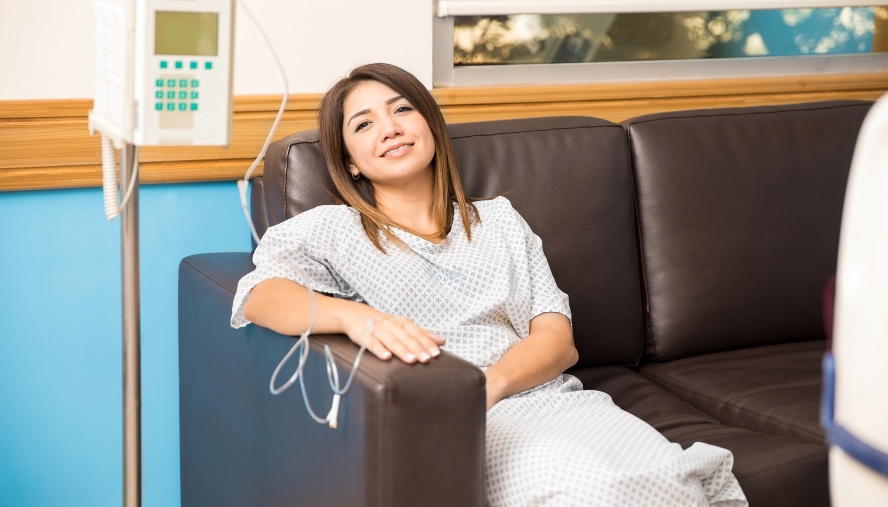
Possible New Treatment for CF and NTM
Researchers in the ABATE Study are testing the safety of a drug called gallium nitrate for people with cystic fibrosis (CF) who also have been diagnosed with nontuberculous mycobacteria (NTM).
- Gender
- Any
- Ages
- 18+
- Compensation
- Provided
- Time Required
- 8 in-person visits, including two 5-day inpatient stays, and 4 phone calls over 28 weeks

Effects of Keto Diet in People with HFpEF
The keto diet has helped many people lose weight and improve their overall health. Researchers are investigating if it can also benefit people with a specific type of heart failure.
- Gender
- Any
- Ages
- 21-79
- Compensation
- Provided
- Time Required
- 12-week post-study testing is complete. There will be an option to enroll in a 12-week extension arm (for a total of 24 weeks). Primary study commitment will involve a total of 9 visits

Treating Deployment-Related Asthma with Supplements
Many people returning from military deployment have developed asthma as a result of inhaling hazardous materials. Exposures to diesel, burn pits, biomass smoke and sandstorms during deployment likely play a role. Some people with deployment-related asthma do not respond well to standard asthma medications.
- Gender
- Any
- Ages
- 18-70
- Compensation
- Provided
- Time Required
- 5-6 clinic visits over 18-22 weeks
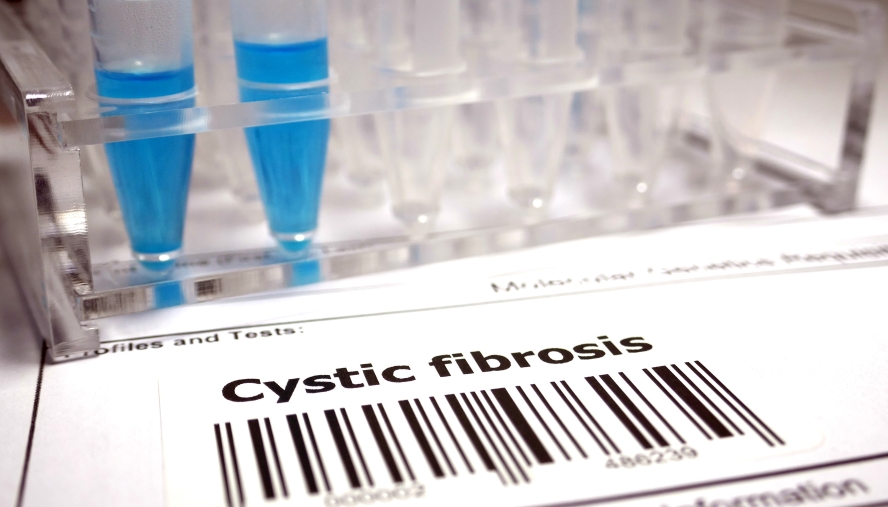
BEACON-CF: Investigational mRNA Therapy for Cystic Fibrosis
For many people living with cystic fibrosis, there are treatments available called cystic fibrosis transmembrane conductance regulator (CFTR) modulators that can help treat the underlying cause of cystic fibrosis. However, more than 5,000 people living with cystic fibrosis have a change in both of their CFTR genes that makes them not expected to benefit from CFTR modulators.
- Gender
- Any
- Ages
- 18-65
- Compensation
- Provided
- Time Required
- 28 weeks with 8 in-person visits and 4 phone calls.
.jpg?lang=en-US&ext=.jpg)
Extensive Stage Small Cell Lung Cancer Combination Treatment
Determine the efficacy and safety of lurbinectedin (a type of chemotherapy) when combined with atezolizumab (an immunotherapy treatment) as a maintenance treatment for those with ES-SCLC.
- Gender
- Any
- Ages
- 18+
- Compensation
- Provided
- Time Required
- Two or more years
.jpg?lang=en-US&ext=.jpg)
PRA023 for Systemic Sclerosis with Interstitial Lung Disease
Researchers are studying a new medication called PRA023 that has anti-inflammatory and antifibrotic properties to determine how well it works against systemic sclerosis (SSc) with interstitial lung disease (ILD).
- Gender
- Any
- Ages
- 18+
- Compensation
- Not Provided
- Time Required
- Monthly visits over 50-week timeframe
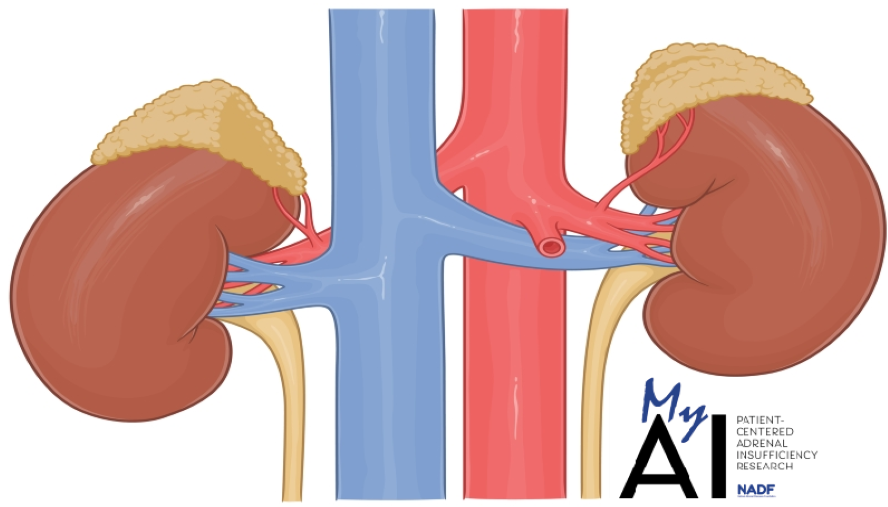.png?lang=en-US&ext=.png)
MyAI Registry for People with Adrenal Insufficiency
To help better understand adrenal insufficiency (AI) and its progression, researchers have developed a new registry called MyAI.
- Gender
- Any
- Ages
- All Ages
- Compensation
- Not Provided
- Time Required
- Initial online survey will take 30 minutes. Follow-up surveys every six months will take five to 10 minutes. Total time involvement is 10-20 years.
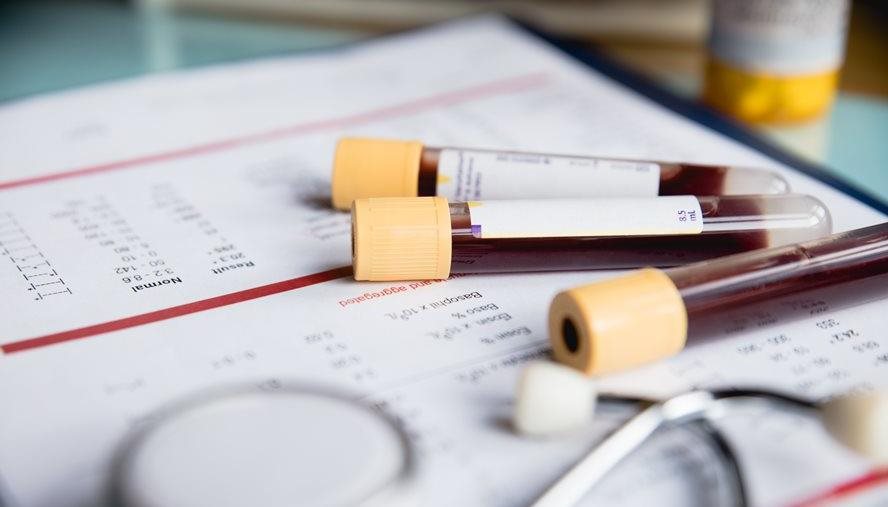
Blood Test to Help Identify Cancer
Researchers want to learn if a blood test can be used to identify cancers in adults. Current or former smokers who have been diagnosed with cancer but haven’t started treatment are needed for this trial. Participants will receive a blood draw and review of their medical history with a research coordinator.
- Gender
- Any
- Ages
- 50+
- Compensation
- Provided
- Time Required
- One in-person visit for enrollment, remote follow up visit 12 months later

OCEAN Study for EGPA
People with eosinophilic granulomatosis with polyangiitis (EGPA) are needed for the OCEAN clinical trial. The study compares two medications: mepolizumab (NUCALA), which is administered by an injection once a month, and depemokimab, an investigational medication that is injected twice a year.
- Gender
- Any
- Ages
- 18+
- Compensation
- Provided
- Time Required
- Once a month visits for approximately 15 months
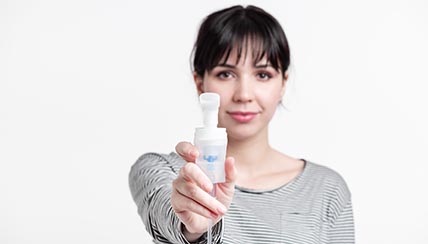
Investigational Gene Therapy for Adults with CF
Adults with Cystic Fibrosis who are unable to take CFTR modulators are being asked to participate in a clinical trial for an investigational gene therapy drug known as 4D-710.
- Gender
- Any
- Ages
- 18+
- Compensation
- Provided
- Time Required
- 24 months

Predict and Prevent Lung Disease
Researchers are asking healthy adults, 25-35 years old, to join a five-year study exploring factors that may affect lung health with the goal of understanding lung disease.
- Gender
- Any
- Ages
- 25-35
- Compensation
- Provided
- Time Required
- 1 four-hour in-clinic visit, followed by remote follow up for up to 4 ½ years

SEAL Study: Stopping Eczema and Allergy
Can allergies be prevented in infants? Researchers want to know if keeping a baby’s skin healthy and hydrated with moisturizer will prevent the child from developing allergies such as food allergies. Learn how you and your child can help researchers.
- Gender
- Any
- Ages
- Newborn to 12-weeks-old
- Compensation
- Provided
- Time Required
- Three years, with six clinic visits and weekly or monthly phone calls with researchers

Healthy People Needed for Sarcoidosis Research
Researchers are working to understand the different ways sarcoidosis, a disease that causes scarring in the lungs, develops.
- Gender
- Any
- Ages
- 18-80
- Compensation
- Provided
- Time Required
- Not Specified
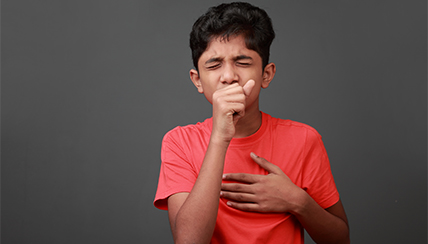
Skin, Airway & Esophageal Epithelial Barriers in Youth
Researchers want to better understand if the causes of asthma, eczema, food allergies, eosinophilic esophagitis and GERD can be determined at a cellular level.
- Gender
- Any
- Ages
- 2-21
- Compensation
- Provided
- Time Required
- Not Specified
.jpg?lang=en-US&ext=.jpg)
SUNBEAM: Studying Allergy Development in Babies
Why do babies develop food allergies and eczema? Researchers are studying factors before birth and through age 3 that may influence the development of allergic conditions.
- Gender
- Any
- Ages
- 18+
- Compensation
- Provided
- Time Required
- Up to 3 years of participation

Skin Reactions to Cancer Immunotherapy
Adults with cancer who are receiving immunotherapy are needed for a new research study to understand how immunotherapy changes the body’s immune response leading to skin reactions.
- Gender
- Any
- Ages
- 18+
- Compensation
- Provided
- Time Required
- Up to 2 visits over 3 months, with possible phone follow-up after 12 months depending on cancer treatment response

Potential New Treatment for Alpha-1 Antitrypsin Deficiency
Researchers want to see if a new drug, alvelestat, improves the symptoms of lung disease caused by COPD due to alpha-1 antitrypsin deficiency (AATD), as well as symptoms of AATD.
- Gender
- Any
- Ages
- 18-80
- Compensation
- Provided
- Time Required
- Not Specified
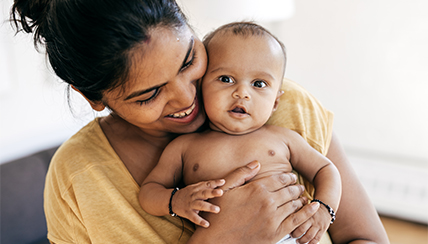
Understanding Allergy Development in Infants
Researchers want to know what causes food allergies, eczema and wheezing in infants. If you’re pregnant, you may be able to help find the answer.
- Gender
- Any
- Ages
- 0-50
- Compensation
- Provided
- Time Required
- 3 in person visits and 1 telephone call, followed by 4 optional visits

Can Pembrolizumab (MK3475) with SBRT Treatment Stop or Slow Non-Small Cell Lung Cancer?
Patients with medically inoperable stage I/IIA non-small cell lung cancer (NSCLC) who have not received prior anticancer therapy for lung cancer, may qualify for a clinical trial investigating if the combination of pembrolizumab (MK-3475) and Stereotactic Body Radiation Therapy (SBRT) may help stop or slow a relapse of NSCLC compared to SBRT alone.
- Gender
- Any
- Ages
- 18+
- Compensation
- Provided
- Time Required
- Up to 7 years
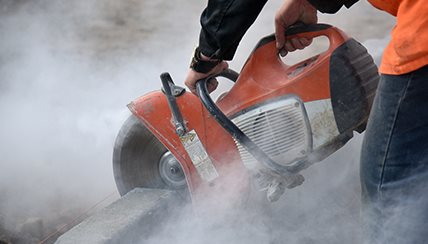
Silicosis Registry
If you’ve been exposed to silica dust, like stone and concrete, you may have developed a silica-related disease. National Jewish Health is creating a registry for silicosis and related diseases in order to better understand their risk factors and prevention.
- Gender
- Any
- Ages
- 18+
- Compensation
- Provided
- Time Required
- 1 clinic or phone visit lasting 1 hour, as well as 15 minute follow-up phone interviews once a year after initial visit
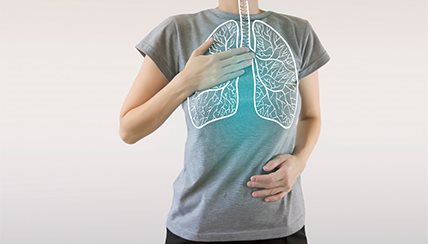
Predicting ILD from Hypersensitivity Pneumonitis
Anyone with hypersensitivity pneumonitis may qualify for this observational study and help researchers find patterns for predicting ILD.
- Gender
- Any
- Ages
- 18-90
- Compensation
- Not Provided
- Time Required
- Clinic visits every 6 months over approximately 2 years (4 visits total)
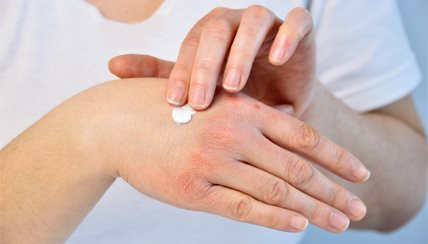
Atopic Dermatitis & Skin Infections
National Jewish Health researchers are trying to determine why people with atopic dermatitis or eczema are more susceptible to bacterial infections. Learn how you can participate in our research study.
- Gender
- Any
- Ages
- 18-65
- Compensation
- Provided
- Time Required
- Up to 3 visits or approximately 3 hours

Identifying Characteristics and Patterns of Asthma
Our researchers are working to identify the clinical, physiologic, genetic and molecular characteristics of asthmatics.
- Gender
- Any
- Ages
- 5+
- Compensation
- Provided
- Time Required
- 2-4 office visits and up to 3 follow up phone calls
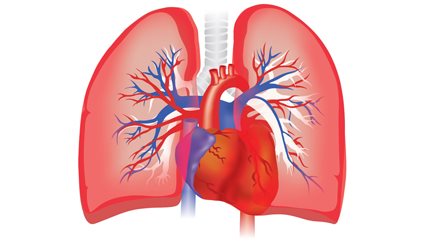
New Trial Medication for Pulmonary Arterial Hypertension
By adding a new investigational Pulmonary Arterial Hypertension (PAH) medication to your current therapy, you could experience relaxed and widened artery walls.
- Gender
- Any
- Ages
- 18-75
- Compensation
- Provided
- Time Required
- Up to 42 months

Healthy Adults Needed for Beryllium Disease Study
By participating in our study, you can help forward research on lung disease. Our researchers are hoping to learn more about the blood cells involved in the development of scarring lung diseases and create new treatment therapies.
- Gender
- Any
- Ages
- 18-80
- Compensation
- Provided
- Time Required
- 5 hours over 2 visits
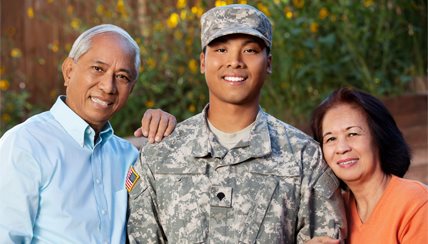.jpg?lang=en-US&ext=.jpg)
Lung Injury from Military Deployment
The purpose of this study is to learn more about lung disease found in contractors and U.S. military personnel serving in Iraq and Afghanistan after September 11, 2001.
- Gender
- Any
- Ages
- 18-70
- Compensation
- Not Provided
- Time Required
- 1 to 2 visits
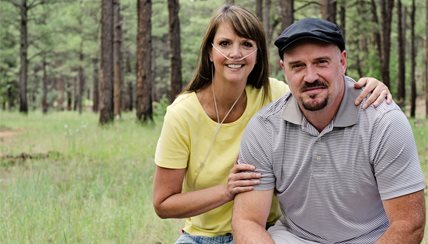
Link Between Rheumatoid Arthritis & Lung Disease
Our researchers are trying to understand the connection, as well as how to prevent and treat lung disease in RA patients.
- Gender
- Any
- Ages
- 18+
- Compensation
- Not Provided
- Time Required
- 6 in-person visits, performed every year over 4 years

ILD & Early Rheumatoid Arthritis
Our researchers are trying to understand how interstitial lung disease (ILD) develops in people with rheumatoid arthritis (RA), and how it may impact their quality of life.
- Gender
- Any
- Ages
- 18-90
- Compensation
- Not Provided
- Time Required
- 5 in-person visits over 18 months

Idiopathic Pulmonary Fibrosis (IPF) & GERD
The purpose of this study is to measure and accurately identify the presence and severity of gastroesphageal reflux disease (GERD), commonly called acid reflux, in idiopathic pulmonary fibrosis (IPF) patients using the Supraglottic Index (SGI).
- Gender
- Any
- Ages
- 40-95
- Compensation
- Provided
- Time Required
- 5 visits over a 6-month period, visits are every 3 months

Immune Pathways & Development of Sarcoidosis
If you are an adult with sarcoidosis who is not on immunosuppressive therapy, you may be able to help our researchers learn more about different types of sarcoidosis and how it develops.
- Gender
- Any
- Ages
- 18+
- Compensation
- Provided
- Time Required
- Up to 2 visits

Pulmonary Fibrosis & Genetic Factors
The purpose of this study is to investigate inherited genetic factors that play a role in the development of familial pulmonary fibrosis and to identify a group of genes that predispose individuals to develop pulmonary fibrosis.
- Gender
- Any
- Ages
- Not Specified
- Compensation
- Not Provided
- Time Required
- Not Specified
.jpg?lang=en-US&ext=.jpg)
Understanding Skin Problems from Eczema and Food Allergies
Researchers are studying the differences in the skin and immune cells of people with food allergies and eczema, and those without.
- Gender
- Any
- Ages
- Not Specified
- Compensation
- Provided
- Time Required
- Not Specified
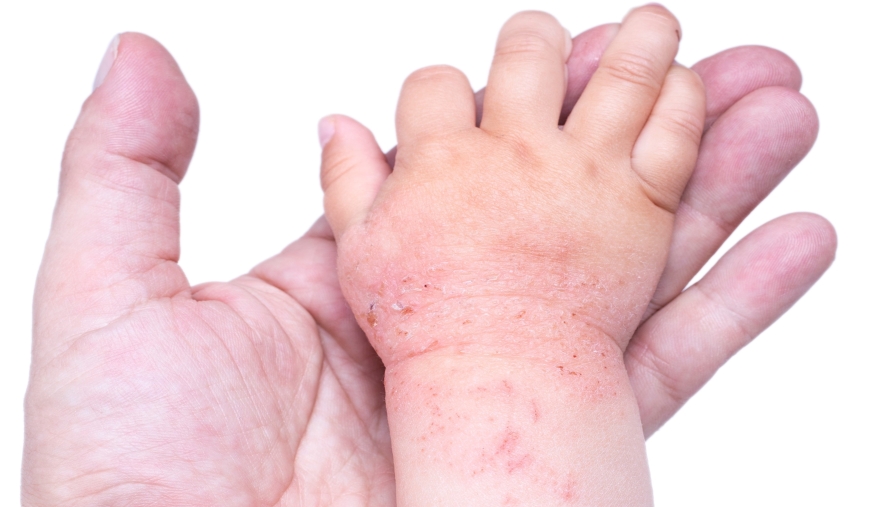.jpg?width=888&height=507&ext=.jpg)
ADRN-12/LEADS (Longitudinal Endotyping of Atopic Dermatitis Through Transcriptomic Skin Analysis)
Eczema (atopic dermatitis) is typically classified as mild, moderate or severe. In this trial, researchers are studying gene expression for the varying severity levels of eczema in order to guide new and improved treatments strategies and more personalized treatments.
- Gender
- Any
- Ages
- 6-65
- Compensation
- Provided
- Time Required
- 7-8 clinic visits over five to six months.

Pulmonary Arterial Hypertension & increased dose of Opsumit
The UNISUS study will compare the effectiveness and safety of a higher dose of an investigational medication called Opsumit to a lower dose in people with pulmonary arterial hypertension (PAH). The results of the UNISUS Study will provide more information about the investigational medication’s effectiveness and safety when it is given as a higher dose to adults with PAH.
- Gender
- Any
- Ages
- 18+
- Compensation
- Provided
- Time Required
- Up to 4 years. Year 1: monthly visits. Year 2: visits every three months. Years 3-4: visits every six months.

Testing Blood’s Response to Foreign Substances
Researchers are conducting a study of how human blood cells work. Their goal is to examine how these cells respond to different bacteria and other foreign substances.
- Gender
- Any
- Ages
- 21-65
- Compensation
- Provided
- Time Required
- One 30-minute enrollment visit. A one-hour blood draw visit every 8-12 weeks for as long as the participant is interested.

Exploring How Parenthood Impacts Cystic Fibrosis Patients
A growing number of people with cystic fibrosis (CF) are considering parenthood. CF specialists recognize that there is a need to better support first-time parents and need input from them.
- Gender
- Any
- Ages
- 18+
- Compensation
- Provided
- Time Required
- Five years, one in person visit for enrollment, followed by surveys that can be completed remotely. Four surveys are needed during the first year, then two surveys per year for years 2-5.

ASPIRE: Potentially Slowing Lung Fibrosis in IPF
Researchers are examining whether an investigational medication called buloxibutid can slow down lung scarring and improve breathing for people with idiopathic pulmonary fibrosis (IPF). Volunteers are needed. Learn if you are eligible for the ASPIRE IPF trial
- Gender
- Any
- Ages
- 40+
- Compensation
- Provided
- Time Required
- 8 clinic visits and 8 phone or video calls over approximately 62 weeks.

Potential New Treatment for EGPA to Reduce Need for Oral Steroids
Researchers in this clinical trial want to determine if a new investigational treatment called NS-229 can help people with EGPA experience remission of their symptoms or reduce the need for oral steroids.
- Gender
- Any
- Ages
- 18+
- Compensation
- Provided
- Time Required
- 11 visits over 36 weeks (9 months). The first treatment visit will last up to 8 hours, and all other study visits will take approximately 3 hours.
Adult Trials

Discovering New Ways to Treat Modulator-Ineligible CF
The REACH Study is a long-term, observational study aiming to gather high-quality data on people with cystic fibrosis (CF) who cannot benefit from CFTR modulators. By collecting core data, REACH will help develop and assess future therapies for this population.
- Gender
- Any
- Ages
- 12+
- Compensation
- Provided
- Time Required
- 4 clinic visits over the course of a year, at enrollment, 3 months, 6 months and 12 months.

LCI Testing Possible Tool for Identifying ILD Risks in Scleroderma Patients
Lung clearance testing may give researchers a new tool to predict people with scleroderma who are at risk of developing interstitial lung disease. Volunteers are needed for a one-visit clinical trial.
- Gender
- Any
- Ages
- 21-75
- Compensation
- Not Provided
- Time Required
- One 60-minute clinic visit, followed up by one phone call a year for the next 5 years.

Understanding Common Insomnia Treatments in Adults
Chronic insomnia is a serious health concern that affects around 10% of people in America. Current treatments are varied, and often target things that may result in sleep disruption. In this study, researchers are evaluating two common treatments for insomnia in adults to learn more about how they treat symptoms.
- Gender
- Any
- Ages
- 18+
- Compensation
- Provided
- Time Required
- Visits and home data collection over approximately 9-12 months. Some visits can occur virtually.

Possible Treatment for Post-COVID POTS
Postural Orthostatic Tachycardia Syndrome, or POTS, is a chronic condition that involves sudden, rapid increases in heart rate when sitting or standing. This condition can disrupt daily life and trigger other symptoms such as fatigue, dizziness or vertigo. Research has linked POTS symptoms to long-haul COVID-19 infections, but the connection between these conditions is still being studied.
- Gender
- Any
- Ages
- 18+
- Compensation
- Provided
- Time Required
- 17 visits over approximately 60 weeks (15 months). The visits will be divided up into four phases: a screening period (4 weeks), a double-blind treatment period (24 weeks), an open-label treatment period (28 weeks) and a follow-up period (4 weeks).

The MIST Clinical Study for PPF
Progressive Pulmonary Fibrosis (PPF) is a rare lung disease that causes scarring in the lung. Researchers are investigating if an inhaled study treatment can help improve lung function with fewer side effects than current treatments.
- Gender
- Any
- Ages
- 18-80
- Compensation
- Provided
- Time Required
- 12 in person visits and 1 phone visit over 56 weeks (13 months), with twice a day nebulizer treatments.

Evaluating Skin Barrier Changes in Food Allergy
Food allergies are complex, and researchers are studying new ways to predict who might develop allergies in the future. In this study, researchers are trying to determine if skin reactions during an oral food challenge can predict food allergies. They also are evaluating if a biologic called omalizumab, which is currently approved to treat asthma, can help people with food allergies.
- Gender
- Any
- Ages
- 1-55
- Compensation
- Provided
- Time Required
- 13 visits over approximately 5 months. Participants without food allergies will only need 1 visit.

Possible New Inhaled Treatment Option for PH with ILD
Pulmonary hypertension (PH), or high blood pressure in the lungs, can often develop in those who have interstitial lung disease (ILD). Treatments for this combination of diseases, called PH-ILD, to try and improve quality of life for people with both conditions are currently being evaluated.
- Gender
- Any
- Ages
- 18-75
- Compensation
- Provided
- Time Required
- Six visits over approximately 52 weeks, with two initial visits for enrollment and then visits at weeks 8, 16, 24 and 52.

AJAX Study: New Inhaled Medication for Uncontrolled Asthma
In severe asthma, some of the exacerbations that cause difficulty breathing are the result of inflammation in the lung. Researchers are testing a class of anti-inflammatory drugs called a JAK1 inhibitor that has worked to treat other inflammatory conditions like eczema to see if it can help people with severe asthma.
- Gender
- Any
- Ages
- 18-80
- Compensation
- Provided
- Time Required
- 8 visits over 5 months. Visits will last between 1 and 5 hours.

VALIANT Study: A Potential New Treatment for Severe Asthma
Some people with asthma experience frequent exacerbations, involving swelling or narrowing of the airways, which causes shortness of breath, wheezing and cough. In the national study called VALIANT, researchers are evaluating a new investigational treatment called verekitug to see if it is safe and can effectively reduce inflammation to help asthma patients breathe easier.
- Gender
- Any
- Ages
- 18-75
- Compensation
- Provided
- Time Required
- 19 visits over up to 70 weeks (1 year and 4 months). Two screening visits will last about 4 hours each, and all other visits will last between 4 and 6 hours.

XTMAB-16: A New Drug to Reduce Steroid Use in Sarcoidosis
People with pulmonary sarcoidosis usually rely on corticosteroids to help manage symptoms. Researchers are investigating the safety of a new study drug called XTMAB-16 to see if it can help reduce corticosteroid use while treating the disease.
- Gender
- Any
- Ages
- 18-80
- Compensation
- Provided
- Time Required
- Part A: A screening period for up to 42 days, followed by 12 weeks of treatment, including up to 13 clinic visits. Part B: A screening period for up to 42 days, followed by 24 weeks of treatment, including up to 19 clinic visits. After completing either part, participants will have the option to join an extension study. They will be monitored for 6 weeks after their last dose of the medication for safety and immunogenicity assessments.

Treating Deployment-Related Asthma with Supplements
Many people returning from military deployment have developed asthma as a result of inhaling hazardous materials. Exposures to diesel, burn pits, biomass smoke and sandstorms during deployment likely play a role. Some people with deployment-related asthma do not respond well to standard asthma medications.
- Gender
- Any
- Ages
- 18-70
- Compensation
- Provided
- Time Required
- 5-6 clinic visits over 18-22 weeks

BEACON-CF: Investigational mRNA Therapy for Cystic Fibrosis
For many people living with cystic fibrosis, there are treatments available called cystic fibrosis transmembrane conductance regulator (CFTR) modulators that can help treat the underlying cause of cystic fibrosis. However, more than 5,000 people living with cystic fibrosis have a change in both of their CFTR genes that makes them not expected to benefit from CFTR modulators.
- Gender
- Any
- Ages
- 18-65
- Compensation
- Provided
- Time Required
- 28 weeks with 8 in-person visits and 4 phone calls.
.jpg?lang=en-US&ext=.jpg)
Extensive Stage Small Cell Lung Cancer Combination Treatment
Determine the efficacy and safety of lurbinectedin (a type of chemotherapy) when combined with atezolizumab (an immunotherapy treatment) as a maintenance treatment for those with ES-SCLC.
- Gender
- Any
- Ages
- 18+
- Compensation
- Provided
- Time Required
- Two or more years
.jpg?lang=en-US&ext=.jpg)
PRA023 for Systemic Sclerosis with Interstitial Lung Disease
Researchers are studying a new medication called PRA023 that has anti-inflammatory and antifibrotic properties to determine how well it works against systemic sclerosis (SSc) with interstitial lung disease (ILD).
- Gender
- Any
- Ages
- 18+
- Compensation
- Not Provided
- Time Required
- Monthly visits over 50-week timeframe
.png?lang=en-US&ext=.png)
MyAI Registry for People with Adrenal Insufficiency
To help better understand adrenal insufficiency (AI) and its progression, researchers have developed a new registry called MyAI.
- Gender
- Any
- Ages
- All Ages
- Compensation
- Not Provided
- Time Required
- Initial online survey will take 30 minutes. Follow-up surveys every six months will take five to 10 minutes. Total time involvement is 10-20 years.

Blood Test to Help Identify Cancer
Researchers want to learn if a blood test can be used to identify cancers in adults. Current or former smokers who have been diagnosed with cancer but haven’t started treatment are needed for this trial. Participants will receive a blood draw and review of their medical history with a research coordinator.
- Gender
- Any
- Ages
- 50+
- Compensation
- Provided
- Time Required
- One in-person visit for enrollment, remote follow up visit 12 months later

OCEAN Study for EGPA
People with eosinophilic granulomatosis with polyangiitis (EGPA) are needed for the OCEAN clinical trial. The study compares two medications: mepolizumab (NUCALA), which is administered by an injection once a month, and depemokimab, an investigational medication that is injected twice a year.
- Gender
- Any
- Ages
- 18+
- Compensation
- Provided
- Time Required
- Once a month visits for approximately 15 months

Investigational Gene Therapy for Adults with CF
Adults with Cystic Fibrosis who are unable to take CFTR modulators are being asked to participate in a clinical trial for an investigational gene therapy drug known as 4D-710.
- Gender
- Any
- Ages
- 18+
- Compensation
- Provided
- Time Required
- 24 months

Predict and Prevent Lung Disease
Researchers are asking healthy adults, 25-35 years old, to join a five-year study exploring factors that may affect lung health with the goal of understanding lung disease.
- Gender
- Any
- Ages
- 25-35
- Compensation
- Provided
- Time Required
- 1 four-hour in-clinic visit, followed by remote follow up for up to 4 ½ years

Healthy People Needed for Sarcoidosis Research
Researchers are working to understand the different ways sarcoidosis, a disease that causes scarring in the lungs, develops.
- Gender
- Any
- Ages
- 18-80
- Compensation
- Provided
- Time Required
- Not Specified

Skin, Airway & Esophageal Epithelial Barriers in Youth
Researchers want to better understand if the causes of asthma, eczema, food allergies, eosinophilic esophagitis and GERD can be determined at a cellular level.
- Gender
- Any
- Ages
- 2-21
- Compensation
- Provided
- Time Required
- Not Specified
.jpg?lang=en-US&ext=.jpg)
SUNBEAM: Studying Allergy Development in Babies
Why do babies develop food allergies and eczema? Researchers are studying factors before birth and through age 3 that may influence the development of allergic conditions.
- Gender
- Any
- Ages
- 18+
- Compensation
- Provided
- Time Required
- Up to 3 years of participation

Skin Reactions to Cancer Immunotherapy
Adults with cancer who are receiving immunotherapy are needed for a new research study to understand how immunotherapy changes the body’s immune response leading to skin reactions.
- Gender
- Any
- Ages
- 18+
- Compensation
- Provided
- Time Required
- Up to 2 visits over 3 months, with possible phone follow-up after 12 months depending on cancer treatment response

Understanding Allergy Development in Infants
Researchers want to know what causes food allergies, eczema and wheezing in infants. If you’re pregnant, you may be able to help find the answer.
- Gender
- Any
- Ages
- 0-50
- Compensation
- Provided
- Time Required
- 3 in person visits and 1 telephone call, followed by 4 optional visits

Can Pembrolizumab (MK3475) with SBRT Treatment Stop or Slow Non-Small Cell Lung Cancer?
Patients with medically inoperable stage I/IIA non-small cell lung cancer (NSCLC) who have not received prior anticancer therapy for lung cancer, may qualify for a clinical trial investigating if the combination of pembrolizumab (MK-3475) and Stereotactic Body Radiation Therapy (SBRT) may help stop or slow a relapse of NSCLC compared to SBRT alone.
- Gender
- Any
- Ages
- 18+
- Compensation
- Provided
- Time Required
- Up to 7 years

Silicosis Registry
If you’ve been exposed to silica dust, like stone and concrete, you may have developed a silica-related disease. National Jewish Health is creating a registry for silicosis and related diseases in order to better understand their risk factors and prevention.
- Gender
- Any
- Ages
- 18+
- Compensation
- Provided
- Time Required
- 1 clinic or phone visit lasting 1 hour, as well as 15 minute follow-up phone interviews once a year after initial visit

Predicting ILD from Hypersensitivity Pneumonitis
Anyone with hypersensitivity pneumonitis may qualify for this observational study and help researchers find patterns for predicting ILD.
- Gender
- Any
- Ages
- 18-90
- Compensation
- Not Provided
- Time Required
- Clinic visits every 6 months over approximately 2 years (4 visits total)

Atopic Dermatitis & Skin Infections
National Jewish Health researchers are trying to determine why people with atopic dermatitis or eczema are more susceptible to bacterial infections. Learn how you can participate in our research study.
- Gender
- Any
- Ages
- 18-65
- Compensation
- Provided
- Time Required
- Up to 3 visits or approximately 3 hours

Identifying Characteristics and Patterns of Asthma
Our researchers are working to identify the clinical, physiologic, genetic and molecular characteristics of asthmatics.
- Gender
- Any
- Ages
- 5+
- Compensation
- Provided
- Time Required
- 2-4 office visits and up to 3 follow up phone calls

New Trial Medication for Pulmonary Arterial Hypertension
By adding a new investigational Pulmonary Arterial Hypertension (PAH) medication to your current therapy, you could experience relaxed and widened artery walls.
- Gender
- Any
- Ages
- 18-75
- Compensation
- Provided
- Time Required
- Up to 42 months

Healthy Adults Needed for Beryllium Disease Study
By participating in our study, you can help forward research on lung disease. Our researchers are hoping to learn more about the blood cells involved in the development of scarring lung diseases and create new treatment therapies.
- Gender
- Any
- Ages
- 18-80
- Compensation
- Provided
- Time Required
- 5 hours over 2 visits
.jpg?lang=en-US&ext=.jpg)
Lung Injury from Military Deployment
The purpose of this study is to learn more about lung disease found in contractors and U.S. military personnel serving in Iraq and Afghanistan after September 11, 2001.
- Gender
- Any
- Ages
- 18-70
- Compensation
- Not Provided
- Time Required
- 1 to 2 visits

Link Between Rheumatoid Arthritis & Lung Disease
Our researchers are trying to understand the connection, as well as how to prevent and treat lung disease in RA patients.
- Gender
- Any
- Ages
- 18+
- Compensation
- Not Provided
- Time Required
- 6 in-person visits, performed every year over 4 years

ILD & Early Rheumatoid Arthritis
Our researchers are trying to understand how interstitial lung disease (ILD) develops in people with rheumatoid arthritis (RA), and how it may impact their quality of life.
- Gender
- Any
- Ages
- 18-90
- Compensation
- Not Provided
- Time Required
- 5 in-person visits over 18 months

Idiopathic Pulmonary Fibrosis (IPF) & GERD
The purpose of this study is to measure and accurately identify the presence and severity of gastroesphageal reflux disease (GERD), commonly called acid reflux, in idiopathic pulmonary fibrosis (IPF) patients using the Supraglottic Index (SGI).
- Gender
- Any
- Ages
- 40-95
- Compensation
- Provided
- Time Required
- 5 visits over a 6-month period, visits are every 3 months

Immune Pathways & Development of Sarcoidosis
If you are an adult with sarcoidosis who is not on immunosuppressive therapy, you may be able to help our researchers learn more about different types of sarcoidosis and how it develops.
- Gender
- Any
- Ages
- 18+
- Compensation
- Provided
- Time Required
- Up to 2 visits

Pulmonary Fibrosis & Genetic Factors
The purpose of this study is to investigate inherited genetic factors that play a role in the development of familial pulmonary fibrosis and to identify a group of genes that predispose individuals to develop pulmonary fibrosis.
- Gender
- Any
- Ages
- Not Specified
- Compensation
- Not Provided
- Time Required
- Not Specified
.jpg?lang=en-US&ext=.jpg)
Understanding Skin Problems from Eczema and Food Allergies
Researchers are studying the differences in the skin and immune cells of people with food allergies and eczema, and those without.
- Gender
- Any
- Ages
- Not Specified
- Compensation
- Provided
- Time Required
- Not Specified
.jpg?width=888&height=507&ext=.jpg)
ADRN-12/LEADS (Longitudinal Endotyping of Atopic Dermatitis Through Transcriptomic Skin Analysis)
Eczema (atopic dermatitis) is typically classified as mild, moderate or severe. In this trial, researchers are studying gene expression for the varying severity levels of eczema in order to guide new and improved treatments strategies and more personalized treatments.
- Gender
- Any
- Ages
- 6-65
- Compensation
- Provided
- Time Required
- 7-8 clinic visits over five to six months.

Pulmonary Arterial Hypertension & increased dose of Opsumit
The UNISUS study will compare the effectiveness and safety of a higher dose of an investigational medication called Opsumit to a lower dose in people with pulmonary arterial hypertension (PAH). The results of the UNISUS Study will provide more information about the investigational medication’s effectiveness and safety when it is given as a higher dose to adults with PAH.
- Gender
- Any
- Ages
- 18+
- Compensation
- Provided
- Time Required
- Up to 4 years. Year 1: monthly visits. Year 2: visits every three months. Years 3-4: visits every six months.

Testing Blood’s Response to Foreign Substances
Researchers are conducting a study of how human blood cells work. Their goal is to examine how these cells respond to different bacteria and other foreign substances.
- Gender
- Any
- Ages
- 21-65
- Compensation
- Provided
- Time Required
- One 30-minute enrollment visit. A one-hour blood draw visit every 8-12 weeks for as long as the participant is interested.

Exploring How Parenthood Impacts Cystic Fibrosis Patients
A growing number of people with cystic fibrosis (CF) are considering parenthood. CF specialists recognize that there is a need to better support first-time parents and need input from them.
- Gender
- Any
- Ages
- 18+
- Compensation
- Provided
- Time Required
- Five years, one in person visit for enrollment, followed by surveys that can be completed remotely. Four surveys are needed during the first year, then two surveys per year for years 2-5.

ASPIRE: Potentially Slowing Lung Fibrosis in IPF
Researchers are examining whether an investigational medication called buloxibutid can slow down lung scarring and improve breathing for people with idiopathic pulmonary fibrosis (IPF). Volunteers are needed. Learn if you are eligible for the ASPIRE IPF trial
- Gender
- Any
- Ages
- 40+
- Compensation
- Provided
- Time Required
- 8 clinic visits and 8 phone or video calls over approximately 62 weeks.

Potential New Treatment for EGPA to Reduce Need for Oral Steroids
Researchers in this clinical trial want to determine if a new investigational treatment called NS-229 can help people with EGPA experience remission of their symptoms or reduce the need for oral steroids.
- Gender
- Any
- Ages
- 18+
- Compensation
- Provided
- Time Required
- 11 visits over 36 weeks (9 months). The first treatment visit will last up to 8 hours, and all other study visits will take approximately 3 hours.
Pediatric Trials

Discovering New Ways to Treat Modulator-Ineligible CF
The REACH Study is a long-term, observational study aiming to gather high-quality data on people with cystic fibrosis (CF) who cannot benefit from CFTR modulators. By collecting core data, REACH will help develop and assess future therapies for this population.
- Gender
- Any
- Ages
- 12+
- Compensation
- Provided
- Time Required
- 4 clinic visits over the course of a year, at enrollment, 3 months, 6 months and 12 months.

Can Combination Rescue Inhalers help Adolescents Control Asthma Flare Ups?
Researchers with the ACADIA Study are trying to determine if a rescue inhaler that doctors can currently prescribe for adults can also help adolescents control their asthma flare-ups. Volunteers are needed. Learn if you are eligible:
- Gender
- Any
- Ages
- 12-18
- Compensation
- Provided
- Time Required
- Approximately 58 weeks (13 months).

Evaluating Skin Barrier Changes in Food Allergy
Food allergies are complex, and researchers are studying new ways to predict who might develop allergies in the future. In this study, researchers are trying to determine if skin reactions during an oral food challenge can predict food allergies. They also are evaluating if a biologic called omalizumab, which is currently approved to treat asthma, can help people with food allergies.
- Gender
- Any
- Ages
- 1-55
- Compensation
- Provided
- Time Required
- 13 visits over approximately 5 months. Participants without food allergies will only need 1 visit.

Potential Treatment for Dry Skin in Pediatric Eczema Patients
Many people with eczema (also known as atopic dermatitis) have dry skin, in addition to their other symptoms, which can worsen itching, scratching and skin pain. Researchers want to know if dupilumab, a current immune system treatment for eczema, also may be able to have a long-term impact on dry skin in children with eczema.
- Gender
- Any
- Ages
- 6-12
- Compensation
- Provided
- Time Required
- Approximately 11 clinic visits spread into three periods (screening, intervention, and follow-up) over the course of two years.
.png?lang=en-US&ext=.png)
MyAI Registry for People with Adrenal Insufficiency
To help better understand adrenal insufficiency (AI) and its progression, researchers have developed a new registry called MyAI.
- Gender
- Any
- Ages
- All Ages
- Compensation
- Not Provided
- Time Required
- Initial online survey will take 30 minutes. Follow-up surveys every six months will take five to 10 minutes. Total time involvement is 10-20 years.

SEAL Study: Stopping Eczema and Allergy
Can allergies be prevented in infants? Researchers want to know if keeping a baby’s skin healthy and hydrated with moisturizer will prevent the child from developing allergies such as food allergies. Learn how you and your child can help researchers.
- Gender
- Any
- Ages
- Newborn to 12-weeks-old
- Compensation
- Provided
- Time Required
- Three years, with six clinic visits and weekly or monthly phone calls with researchers

Skin, Airway & Esophageal Epithelial Barriers in Youth
Researchers want to better understand if the causes of asthma, eczema, food allergies, eosinophilic esophagitis and GERD can be determined at a cellular level.
- Gender
- Any
- Ages
- 2-21
- Compensation
- Provided
- Time Required
- Not Specified
.jpg?lang=en-US&ext=.jpg)
SUNBEAM: Studying Allergy Development in Babies
Why do babies develop food allergies and eczema? Researchers are studying factors before birth and through age 3 that may influence the development of allergic conditions.
- Gender
- Any
- Ages
- 18+
- Compensation
- Provided
- Time Required
- Up to 3 years of participation

Understanding Allergy Development in Infants
Researchers want to know what causes food allergies, eczema and wheezing in infants. If you’re pregnant, you may be able to help find the answer.
- Gender
- Any
- Ages
- 0-50
- Compensation
- Provided
- Time Required
- 3 in person visits and 1 telephone call, followed by 4 optional visits

Identifying Characteristics and Patterns of Asthma
Our researchers are working to identify the clinical, physiologic, genetic and molecular characteristics of asthmatics.
- Gender
- Any
- Ages
- 5+
- Compensation
- Provided
- Time Required
- 2-4 office visits and up to 3 follow up phone calls
.jpg?lang=en-US&ext=.jpg)
Understanding Skin Problems from Eczema and Food Allergies
Researchers are studying the differences in the skin and immune cells of people with food allergies and eczema, and those without.
- Gender
- Any
- Ages
- Not Specified
- Compensation
- Provided
- Time Required
- Not Specified
.jpg?width=888&height=507&ext=.jpg)
ADRN-12/LEADS (Longitudinal Endotyping of Atopic Dermatitis Through Transcriptomic Skin Analysis)
Eczema (atopic dermatitis) is typically classified as mild, moderate or severe. In this trial, researchers are studying gene expression for the varying severity levels of eczema in order to guide new and improved treatments strategies and more personalized treatments.
- Gender
- Any
- Ages
- 6-65
- Compensation
- Provided
- Time Required
- 7-8 clinic visits over five to six months.
Healthy Participant Trials

Understanding Common Insomnia Treatments in Adults
Chronic insomnia is a serious health concern that affects around 10% of people in America. Current treatments are varied, and often target things that may result in sleep disruption. In this study, researchers are evaluating two common treatments for insomnia in adults to learn more about how they treat symptoms.
- Gender
- Any
- Ages
- 18+
- Compensation
- Provided
- Time Required
- Visits and home data collection over approximately 9-12 months. Some visits can occur virtually.

Possible Treatment for Post-COVID POTS
Postural Orthostatic Tachycardia Syndrome, or POTS, is a chronic condition that involves sudden, rapid increases in heart rate when sitting or standing. This condition can disrupt daily life and trigger other symptoms such as fatigue, dizziness or vertigo. Research has linked POTS symptoms to long-haul COVID-19 infections, but the connection between these conditions is still being studied.
- Gender
- Any
- Ages
- 18+
- Compensation
- Provided
- Time Required
- 17 visits over approximately 60 weeks (15 months). The visits will be divided up into four phases: a screening period (4 weeks), a double-blind treatment period (24 weeks), an open-label treatment period (28 weeks) and a follow-up period (4 weeks).

The MIST Clinical Study for PPF
Progressive Pulmonary Fibrosis (PPF) is a rare lung disease that causes scarring in the lung. Researchers are investigating if an inhaled study treatment can help improve lung function with fewer side effects than current treatments.
- Gender
- Any
- Ages
- 18-80
- Compensation
- Provided
- Time Required
- 12 in person visits and 1 phone visit over 56 weeks (13 months), with twice a day nebulizer treatments.

Evaluating Skin Barrier Changes in Food Allergy
Food allergies are complex, and researchers are studying new ways to predict who might develop allergies in the future. In this study, researchers are trying to determine if skin reactions during an oral food challenge can predict food allergies. They also are evaluating if a biologic called omalizumab, which is currently approved to treat asthma, can help people with food allergies.
- Gender
- Any
- Ages
- 1-55
- Compensation
- Provided
- Time Required
- 13 visits over approximately 5 months. Participants without food allergies will only need 1 visit.

Possible New Inhaled Treatment Option for PH with ILD
Pulmonary hypertension (PH), or high blood pressure in the lungs, can often develop in those who have interstitial lung disease (ILD). Treatments for this combination of diseases, called PH-ILD, to try and improve quality of life for people with both conditions are currently being evaluated.
- Gender
- Any
- Ages
- 18-75
- Compensation
- Provided
- Time Required
- Six visits over approximately 52 weeks, with two initial visits for enrollment and then visits at weeks 8, 16, 24 and 52.
.jpg?lang=en-US&ext=.jpg)
Extensive Stage Small Cell Lung Cancer Combination Treatment
Determine the efficacy and safety of lurbinectedin (a type of chemotherapy) when combined with atezolizumab (an immunotherapy treatment) as a maintenance treatment for those with ES-SCLC.
- Gender
- Any
- Ages
- 18+
- Compensation
- Provided
- Time Required
- Two or more years
.jpg?lang=en-US&ext=.jpg)
PRA023 for Systemic Sclerosis with Interstitial Lung Disease
Researchers are studying a new medication called PRA023 that has anti-inflammatory and antifibrotic properties to determine how well it works against systemic sclerosis (SSc) with interstitial lung disease (ILD).
- Gender
- Any
- Ages
- 18+
- Compensation
- Not Provided
- Time Required
- Monthly visits over 50-week timeframe
.png?lang=en-US&ext=.png)
MyAI Registry for People with Adrenal Insufficiency
To help better understand adrenal insufficiency (AI) and its progression, researchers have developed a new registry called MyAI.
- Gender
- Any
- Ages
- All Ages
- Compensation
- Not Provided
- Time Required
- Initial online survey will take 30 minutes. Follow-up surveys every six months will take five to 10 minutes. Total time involvement is 10-20 years.

Predict and Prevent Lung Disease
Researchers are asking healthy adults, 25-35 years old, to join a five-year study exploring factors that may affect lung health with the goal of understanding lung disease.
- Gender
- Any
- Ages
- 25-35
- Compensation
- Provided
- Time Required
- 1 four-hour in-clinic visit, followed by remote follow up for up to 4 ½ years

Healthy People Needed for Sarcoidosis Research
Researchers are working to understand the different ways sarcoidosis, a disease that causes scarring in the lungs, develops.
- Gender
- Any
- Ages
- 18-80
- Compensation
- Provided
- Time Required
- Not Specified

Atopic Dermatitis & Skin Infections
National Jewish Health researchers are trying to determine why people with atopic dermatitis or eczema are more susceptible to bacterial infections. Learn how you can participate in our research study.
- Gender
- Any
- Ages
- 18-65
- Compensation
- Provided
- Time Required
- Up to 3 visits or approximately 3 hours
.jpg?lang=en-US&ext=.jpg)
Understanding Skin Problems from Eczema and Food Allergies
Researchers are studying the differences in the skin and immune cells of people with food allergies and eczema, and those without.
- Gender
- Any
- Ages
- Not Specified
- Compensation
- Provided
- Time Required
- Not Specified
.jpg?width=888&height=507&ext=.jpg)
ADRN-12/LEADS (Longitudinal Endotyping of Atopic Dermatitis Through Transcriptomic Skin Analysis)
Eczema (atopic dermatitis) is typically classified as mild, moderate or severe. In this trial, researchers are studying gene expression for the varying severity levels of eczema in order to guide new and improved treatments strategies and more personalized treatments.
- Gender
- Any
- Ages
- 6-65
- Compensation
- Provided
- Time Required
- 7-8 clinic visits over five to six months.

Testing Blood’s Response to Foreign Substances
Researchers are conducting a study of how human blood cells work. Their goal is to examine how these cells respond to different bacteria and other foreign substances.
- Gender
- Any
- Ages
- 21-65
- Compensation
- Provided
- Time Required
- One 30-minute enrollment visit. A one-hour blood draw visit every 8-12 weeks for as long as the participant is interested.
